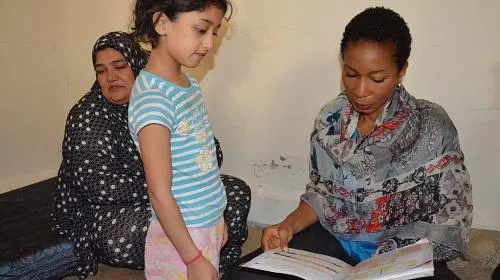Leader of global humanitarian organization visits CARE’s work, meets Jordan’s Queen Rania and Prime Minister
AMMAN (Oct. 2, 2013) – CARE President and CEO Helene D. Gayle visited Jordan this week to see firsthand the poverty-fighting organization’s work with Syrian refugees and meet senior national leaders and officials.
Over half a million Syrians who fled their homeland now live in safe but difficult circumstances in Jordan. And while the public image of the crisis may be that of refugee camps, the vast majority of refugees — 75 percent in Jordan — live outside of camps, struggling to survive in poorer areas of cities. In these urban centers, CARE is helping refugees with emergency cash assistance for shelter, food, and medical care, provision of information on available services, case management and referral services.
“This is the world’s largest refugee crisis since the Rwandan genocide, and yet, in a way, it’s almost invisible,” said Gayle. “But here in the poorest neighborhoods of Amman and other cities of Jordan, inside squalid apartments, seeing the faces of this crisis is unavoidable and shocking. More often than not, they are the faces of mothers and children in desperate living conditions.”
The refugee crisis began in spring 2011, when civil war broke out in Syria. As bombings and shootings escalated, more than 2 million people escaped to neighboring countries like Jordan, Lebanon and Turkey. At least three-quarters of the refugees are women and children.
Gayle was particularly moved by Rawda, a Syrian widow who lost her husband in a bomb blast and now is struggling to care for five young children, including a seven-year-old son unable to walk after being injured by a bomb in Syria. “The situation of the people I’ve met is overwhelming. There are mothers and children who have witnessed their husbands or fathers dying in their arms,” Gayle said.
Soaring prices for food, electricity, and rent have swiftly impoverished hundreds of thousands of Syrians. Many refugees are not legally allowed to work in their host countries, so once their savings are gone, they face destitution.
Donor response, however, has not matched the scale of the humanitarian crisis. As of Oct. 2, the UN-led appeal of $4.4 billion is only at 49 percent funded. And CARE has secured less than 25 percent of the anticipated $50 million in funding needed for its life-saving response.
Nonetheless, CARE is scaling up. In Jordan, CARE’s cash grant program gives Syrian and Iraqi families emergency funds to meet urgent needs. CARE is providing life-saving services to Syrian refugees in Jordan and Lebanon and to people affected by the crisis in Syria. As the conflict escalates, CARE is also starting activities in Egypt and Yemen to help Syrian refugees there. CARE is impartial and neutral. Our support to families affected by the crisis in Syria is based on humanitarian needs alone, no matter people’s religion, political affiliation or ethnicity.
Gayle met with Her Majesty Queen Rania Al-Abdullah of Jordan to discuss the Syrian refugee crisis as well as the long-term women’s empowerment programs that CARE runs in Jordan. Gayle recognized the generosity of Jordan in hosting hundreds of thousands of refugees. She repeated that message in a separate meeting with Prime Minister Abdullah Ensour, where discussions focused on how groups such as CARE can best help in a coordinated refugee response.
For all the challenges, Dr. Gayle said she was also left with a sense of hope while talking to refugees. “I see so much strength in women like Rawda. Even as she struggles to feed her own children, she managed to find a way to enroll them in school. I was truly moved by her resilience and determination.”
About CARE: Founded in 1945 with the creation of the CARE Package®, CARE is a leading humanitarian organization fighting global poverty. CARE has more than six decades of experience delivering emergency aid during times of crisis. Our emergency responses focus on the needs of the most vulnerable populations, particularly girls and women. Last year CARE worked in 84 countries and reached more than 83 million people around the world. To learn more, visit www.care.org.
Media Contacts:
Laura Sheahen (in Atlanta), LSheahen@care.org, +1.404.667.8299
Adel Sarkozi (in Amman), sarkozi@careinternational.org +962 778400425

